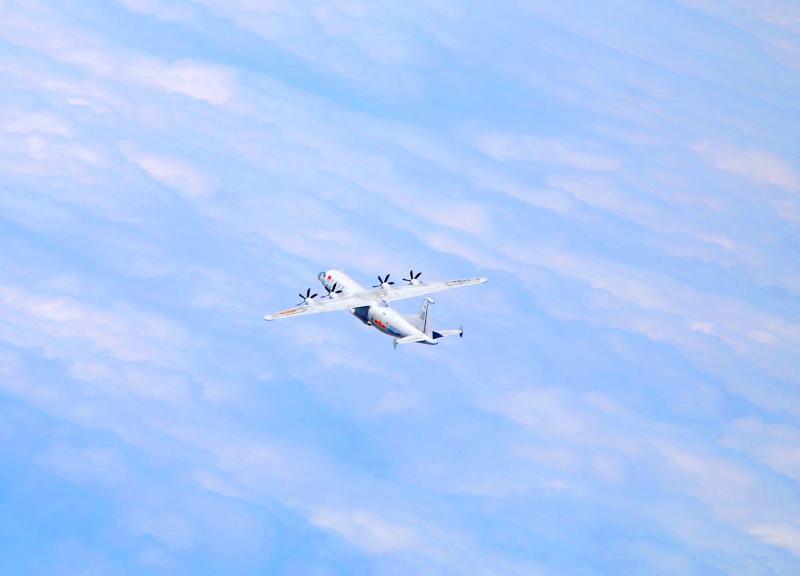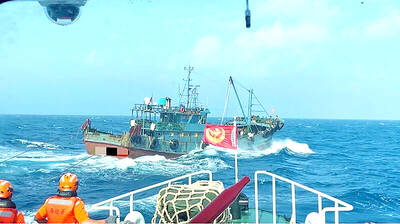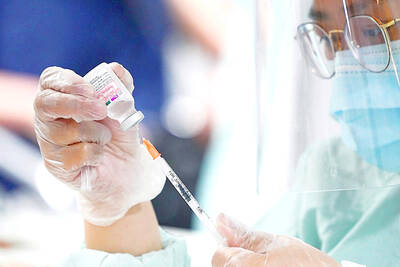Taiwan is bracing for more Chinese military patrols next year, after incursions by the Chinese People’s Liberation Army (PLA) more than doubled this year, fueling concern about a clash between the region’s big powers.
Since January, Chinese warplanes have made about 950 forays into Taiwan’s air defense identification zone (ADIZ), Ministry of National Defense data showed, up from about 380 sorties last year, when the ministry began releasing the data amid a sharp rise in such flights.
Tensions could rise further in the coming year, with key events on the political calendars for Taipei and Beijing. President Tsai Ing-wen (蔡英文) is facing local elections viewed as a bellwether for the next presidential race, while Chinese President Xi Jinping (習近平) is heading toward a party congress in which he is expected to secure a precedent-busting third term in power.

Photo courtesy of the Ministry of National Defense
“China will send more military airplanes into Taiwan’s ADIZ next year with more intimidating operations,” said Kuo Yu-jen (郭育仁), director of the Institute for National Policy Research. “The situation in 2022 is worth being concerned about as it’s going to be a turning point.”
The political events increase pressure on Tsai and Xi to show strength and the resolve to respond to perceived provocations.
US President Joe Biden, who has affirmed the US’ commitment to defend Taiwan from any Chinese attack, also has a political incentive to maintain a firm line toward Beijing before congressional mid-term elections.
Minister of National Defense Chiu Kuo-cheng (邱國正) told lawmakers in October that the closer Chinese planes came to Taiwan, “the stronger we will hit back.”
“China’s quasi-military means are part of its gray-zone tactic to intimidate and coerce Taiwan — it’s a hybrid threat,” said Ou Si-fu (歐錫富), a research fellow at the Institute for National Defense and Security Research, citing other efforts including luring Taiwan’s diplomatic allies away and economic coercion.
“China’s activities in the Strait will increase as its competition with the US intensifies,” Ou added.
The military can handle next year’s expected increase in PLA incursions, Chiu told reporters yesterday during a break in a meeting of the legislature’s Foreign Affairs and National Defense Committee in Taipei.
The armed forces maintain the combat readiness of personnel and equipment at all times with the expectation that the enemy is capable and strong, Chiu said.
On Tuesday, Biden signed the fiscal 2022 US National Defense Authorization Act, which includes provisions recommending that Taiwan be included in next year’s Rim of the Pacific Exercise.
Asked to comment on the act, Chiu said that Taiwan welcomes any aid from foreign governments, but the country’s existing capabilities must be considered before defense cooperation is strengthened.
Additional reporting by Jonathan Chin

POLITICAL AGENDA: Beijing’s cross-strait Mid-Autumn Festival events are part of a ‘cultural united front’ aimed at promoting unification with Taiwan, academics said Local authorities in China have been inviting Taiwanese to participate in cross-strait Mid-Autumn Festival celebrations centered around ideals of “family and nation,” a move Taiwanese academics said politicizes the holiday to promote the idea of “one family” across the Taiwan Strait. Sources said that China’s Fujian Provincial Government is organizing about 20 cross-strait-themed events in cities including Quanzhou, Nanping, Sanming and Zhangzhou. In Zhangzhou, a festival scheduled for Wednesday is to showcase Minnan-language songs and budaixi (布袋戲) glove puppetry to highlight cultural similarities between Taiwan and the region. Elsewhere, Jiangsu Province is hosting more than 10 similar celebrations in Taizhou, Changzhou, Suzhou,

The Republic of China (ROC) is celebrating its 114th Double Ten National Day today, featuring military parades and a variety of performances and speeches in front of the Presidential Office in Taipei. The Taiwan Taiko Association opened the celebrations with a 100-drummer performance, including young percussionists. As per tradition, an air force Mirage 2000 fighter jet flew over the Presidential Office as a part of the performance. The Honor Guards of the ROC and its marching band also heralded in a military parade. Students from Taichung's Shin Min High School then followed with a colorful performance using floral imagery to represent Taiwan's alternate name

COGNITIVE WARFARE: Chinese fishing boats transmitting fake identification signals are meant to test Taiwan’s responses to different kinds of perceived incursions, a report said Chinese vessels are transmitting fake signals in Taiwan’s waters as a form of cognitive warfare, testing Taipei’s responses to various types of incursions, a report by the Institute for the Study of War said on Friday. Several Chinese fishing vessels transmitted fake automatic identification system (AIS) signals in Taiwan’s waters last month, with one mimicking a Russian warship and another impersonating a Chinese law enforcement vessel, the report said. Citing data from Starboard Maritime Intelligence, the report said that throughout August and last month, the Chinese fishing boat Minshiyu 06718 (閩獅漁06718) sailed through the Taiwan Strait while intermittently transmitting its own AIS

CHINESE INFILTRATION: Medical logistics is a lifeline during wartime and the reported CCP links of a major logistics company present a national security threat, an expert said The government would bolster its security check system to prevent China from infiltrating the nation’s medical cold chain, a national security official said yesterday. The official, who wished to stay anonymous, made the remarks after the Chinese-language magazine Mirror Media (鏡周刊) reported that Pharma Logistics (嘉里醫藥物流) is in charge of the medical logistics of about half of the nation’s major hospitals, including National Taiwan University Hospital and Taipei Veterans General Hospital. The company’s parent, Kerry TJ Logistics Co (嘉里大榮物流), is associated with the National Committee of the Chinese People’s Political Consultative Conference (CPPCC) and the Chinese People’s Liberation Army (PLA), the